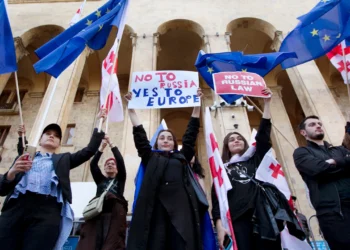Human Lives Human Rights: Rights groups are calling for the acquittal and immediate release of human rights defender Osman Kavala and seven other defendants, ahead of the final hearing in the trial of on 21 March.
In his final opinion, the prosecutor requested that Osman Kavala and Mücella Yapıcı — one of his co-defendants, who served as the spokesperson of Taksim Solidarity at the time of the Gezi Park protests — be found guilty of “attempting to overthrow the government”. They face a possible aggravated life sentence.
This weekend, Osman Kavala marked his 1,600th day in jail. Despite committing no internationally recognized crime, he remains arbitrarily detained on baseless charges in a facility far away from his family.
Since 2017, the prosecuting authorities have tried to conjure a crime out of thin air, but have repeatedly failed.
On the contrary, each tortuous twist in this politically motivated prosecution has further exposed the hollowness of the Turkish justice system.
In January, the Council of Europe’s Committee of Ministers took the rare decision to begin the formal process of infringement against Turkey over their failure to release Osman Kavala.
This came two years after the European Court of Human Rights found that the Turkish authorities have violated Osman Kavala’s right to liberty with the ulterior motive of silencing him, and called for his immediate release.
Meanwhile, the prosecutor also said in his final opinion that the “espionage” charge Kavala is currently being held in prison for is included in the charge he would like Kavala to be found guilty of.
Yet it was in response to this exact charge that the European Court of Human Rights ruled there was no reasonable suspicion that he had committed a crime to justify his imprisonment pending trial.
The Turkish authorities have spent the last two years arguing over the meaning of “espionage” in order to justify his imprisonment.
Osman Kavala will never get back the four-and-a-half years he has already spent behind bars for no other reason than his civil society activism, say rights groups.
Kavala himself and his co-defendants must also be immediately and unconditionally released from prison.”
Osman Kavala was first charged with organizing the Gezi protests — mass demonstrations in 2013 against an urban development project in Istanbul.
After a court acquitted Kavala, the authorities immediately rearrested him for allegedly being behind the 2016 failed coup attempt. They also accused him of “espionage”.
Last summer, the court’s decision to merge the Gezi prosecution with that of 35 football supporters — a move that would have prolonged Kavala’s time behind bars, despite mounting pressure to implement the European Court of Human Right’s ruling and release him — was suddenly overturned at the last hearing in February following a request from the prosecutor.
Turkey is only the second country to face infringement proceedings for failing to implement a binding ruling of the European Court of Human Rights.


















